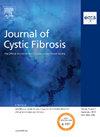用于 F508del CFTR 突变位点特异性基因组编辑的下一代三重形成 PNA。
IF 5.4
2区 医学
Q1 RESPIRATORY SYSTEM
引用次数: 0
摘要
背景:囊性纤维化(CF)是一种常染色体隐性遗传病,由囊性纤维化跨膜传导调节器(CFTR)蛋白的编码基因突变引起,目前尚无法治愈。治疗 CF 的一种方法是纠正 CFTR 基因的潜在突变。我们将装入生物可降解纳米颗粒(NPs)的三重肽核酸(PNAs)与供体 DNA 结合使用,作为纠正与 CF 等遗传疾病有关的基因突变的试剂。此前,我们证明了 PNAs 可诱导供体 DNA 与 CFTR 基因之间的重组,从而纠正人类囊性纤维化支气管上皮细胞(CFBE 细胞)和 CF 小鼠模型中的 F508del CFTR 突变,从而改善 CFTR 功能,且脱靶效应较低,但纠正水平仍低于治疗治愈的阈值。方法:在此,我们报告了新一代化学修饰γPNAs(γPNAs)的使用情况,其γ位含有二甘醇取代物,可增强 DNA 结合力。这些经过修饰的γPNAs能增强人类支气管上皮细胞(CFBE细胞)和CF小鼠原代鼻上皮细胞(NECF细胞)中F508del突变的基因校正:结果:用含有γtcPNAs和供体DNA的NPs处理在气液界面(ALI)生长的CFBE细胞和NECF细胞,通过短路电流测量,CFTR功能增强,基因组DNA分析显示基因编辑率提高(达32%):这些发现为进一步开发用于编辑 CFTR 基因的 PNA 和 NP 技术奠定了基础。本文章由计算机程序翻译,如有差异,请以英文原文为准。
Next generation triplex-forming PNAs for site-specific genome editing of the F508del CFTR mutation
Background
Cystic Fibrosis (CF) is an autosomal recessive genetic disease caused by mutations in the gene encoding the cystic fibrosis transmembrane conductance regulator (CFTR) protein for which there is no cure. One approach to cure CF is to correct the underlying mutations in the CFTR gene. We have used triplex-forming peptide nucleic acids (PNAs) loaded into biodegradable nanoparticles (NPs) in combination with donor DNAs as reagents for correcting mutations associated with genetic diseases including CF. Previously, we demonstrated that PNAs induce recombination between a donor DNA and the CFTR gene, correcting the F508del CFTR mutation in human cystic fibrosis bronchial epithelial cells (CFBE cells) and in a CF murine model leading to improved CFTR function with low off-target effects, however the level of correction was still below the threshold for therapeutic cure.
Methods
Here, we report the use of next generation, chemically modified gamma PNAs (γPNAs) containing a diethylene glycol substitution at the gamma position for enhanced DNA binding. These modified γPNAs yield enhanced gene correction of F508del mutation in human bronchial epithelial cells (CFBE cells) and in primary nasal epithelial cells from CF mice (NECF cells).
Results
Treatment of CFBE cells and NECF cells grown at air-liquid interface (ALI) by NPs containing γtcPNAs and donor DNA resulted in increased CFTR function measured by short circuit current and improved gene editing (up to 32 %) on analysis of genomic DNA.
Conclusions
These findings provide the basis for further development of PNA and NP technology for editing of the CFTR gene.
求助全文
通过发布文献求助,成功后即可免费获取论文全文。
去求助
来源期刊

Journal of Cystic Fibrosis
医学-呼吸系统
CiteScore
10.10
自引率
13.50%
发文量
1361
审稿时长
50 days
期刊介绍:
The Journal of Cystic Fibrosis is the official journal of the European Cystic Fibrosis Society. The journal is devoted to promoting the research and treatment of cystic fibrosis. To this end the journal publishes original scientific articles, editorials, case reports, short communications and other information relevant to cystic fibrosis. The journal also publishes news and articles concerning the activities and policies of the ECFS as well as those of other societies related the ECFS.
 求助内容:
求助内容: 应助结果提醒方式:
应助结果提醒方式:


